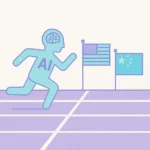The AI community is buzzing with anticipation as OpenAI prepares to launch GPT-5, its most advanced language model, expected later this year. When last we heard, OpenAI CEO Sam Altman was tweeting that GPT-5 will be coming on a timescale of weeks or months.
weeks / months
— Sam Altman (@sama) February 12, 2025
After a period of relative silence, GPT-5 was mentioned again at a recent Fintual / OpenAI sponsored AI Summit in Mexico.
On Cost and Affordability
“The models right now are the most expensive that are ever going to be.” – OpenAI
OpenAI’s representatives shared insights into the company’s hopes that GPT-5 will bring significant improvements over its predecessors. During a question and answer session featuring Carol McCloskey, OpenAI’s Startups liason, and Nicolas Robinson, their Latin American Affairs rep, they talked about the cost of the APIs that underpin AI-powered apps.
That’s a question near and dear to startups in Latin America, where OpenAI’s prices hit a bit harder. “In the case of prices here from API, the models right now are the most expensive that are ever going to be. Always we are doing things so that costs decrease,” McCloskey said. [Translated to English from a mix of Spanish and English.]
OpenAI has a track record of reducing API costs sometimes by a factor of ten. But McCloskey hedged slightly, saying that it’s too early to say whether GPT-5 will follow the same trend: “But let’s see how GPT‑5 goes. I don’t know if it will be so cheap, but let’s see.”
They jokingly pointed out that few other products drop in price as consistently as their APIs:
As Kevin Will, OpenAI’s Chief Product Officer has said, according to Robinson, “I don’t know any other products in the supermarket that every month are 10% cheaper, right?”
GPT-5 to compete in a crowded field
The two challenged the idea that OpenAI can sit on its laurels with market dominance. GPT-5 is being developed with the goal of staying ahead of its competitors like Google’s Gemini, Meta, and Anthropic’s Claude, and startups go with whatever works best.
“Really, we are always competing with [the models] of Gemini, of Meta, of Anthropic, because startups are the companies that are working in the borders and always only want what is the best,” she said.
“So, it’s not like, ‘Oh, they pick AI only because of OpenAI.’ If Anthropic is offering a better model a lot of the time, that’s what we’ll see. They’ll go and they’ll use that. But we hope that with GPT-5 – let’s compete a little bit more.”
The team is focused on improving GPT-5’s coding abilities and making it more useful for startups that are building the next generation of AI tools.
GPT-5 is also being shaped by close collaboration with developers and companies, using their feedback and evaluations to make the model smarter:
“We are constantly working with startups in that feedback, with evaluations saying like … How are we going to build a better model for everyone?” – Carol McCloskey, Startups @ OpenAI
Hurry Up and Wait
As the AI community and competitors await its debut, the hints show GPT-5 is nearly on the horizon, set to push the limits of what generative AI can do.





